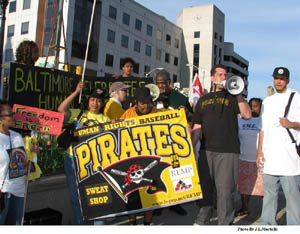Baltimore's Human Rights Zone - Pittsburgh Baltimore Bangladesh living wages now!
Submitted on Wed, 04/29/2009 - 9:04am
 Ten people from Pittsburgh traveled to Baltimore on April 18, 2009
for a B’More Fair and a Human Rights March hosted by the United Workers
Association (UWA). The United Workers Association is the Human Rights
Organization that organized the Camden Yards cleaners, part time
workers, “temporary” workers hired through a contractor, by putting
pressure on Maryland’s Stadium Authority and Peter Angelos, owner of
the Baltimore Oriels Baseball Club. They coined the terms “SweatFree
Baseball” in reference to the sweatshop working conditions at Camden
Yards at the same time as the Pittsburgh Anti Sweatshop Community
Alliance (PASCA) coined the term in reference to its demand that the
Pittsburgh Pirates accept the testimony of sweatshop workers sewing
Pirates apparel. The UWA came to Pittsburgh for the All Star Game in
2006 and joined with PASCA to make the demand that our local baseball
teams respect the Human Rights of all workers.
Ten people from Pittsburgh traveled to Baltimore on April 18, 2009
for a B’More Fair and a Human Rights March hosted by the United Workers
Association (UWA). The United Workers Association is the Human Rights
Organization that organized the Camden Yards cleaners, part time
workers, “temporary” workers hired through a contractor, by putting
pressure on Maryland’s Stadium Authority and Peter Angelos, owner of
the Baltimore Oriels Baseball Club. They coined the terms “SweatFree
Baseball” in reference to the sweatshop working conditions at Camden
Yards at the same time as the Pittsburgh Anti Sweatshop Community
Alliance (PASCA) coined the term in reference to its demand that the
Pittsburgh Pirates accept the testimony of sweatshop workers sewing
Pirates apparel. The UWA came to Pittsburgh for the All Star Game in
2006 and joined with PASCA to make the demand that our local baseball
teams respect the Human Rights of all workers.
The UWA interviewed 150 workers at three restaurants in Baltimore’s Inner Harbor development. The interviews demonstrated systemic violations of workers’ rights such as poverty wages and sexual harassment. The UWA has begun to process these worker rights violations by using the International Declaration of Human Rights like a union contract. By declaring the Inner Harbor a Human Rights Zone, the restaurant bosses, the developer, the public officials who provided subsidies to the Inner Harbor developers and the Baltimore community is made aware that the workers know and intend to exercise their Human Rights to remedy violations of their rights.
The enforcement of workers’ Human Rights is different from traditional union organizing in that it emphasizes workers knowing their rights and exercising them rather than a union contract. The emphasis is not on achieving a union contract but on the community of workers that educate one another and provide support to one another on a daily basis.
There is an obvious similarity between the Human Rights Zone and the Community Benefits Agreements that Pittsburghers have become familiar with in the context the new Penguin’s Hockey Arena. In both cases community groups try to leverage the huge tax subsidies to ensure respect for workers on the job. However, a Human Rights Zone is built on the job AFTER permitting process and tax subsidy is in place – the implementation strategy is focused on workers demanding their rights rather than the mobilization of political support on the boss’s development time frame.
The symbol chosen to advertise and educate about the Human Rights Zone was Harriet Tubman, emphasizing her leadership in the struggle against slavery. Members of the UWA has previously traveled along the Underground Railroad and educated themselves about the struggle against slavery identified themselves as being part of a continuous struggle for Human Rights that has gone on throughout our history. In that spirit, members of the Pittsburgh delegation stopped at Harpers Ferry before arriving in Baltimore to learn about John Brown and the armed resistance he lead more than 20 years before the outbreak of the Civil War.
All were strengthened and affirmed that the International Declaration of Human Rights is indeed a living document. The declaration of Human Rights Zones in Baltimore is similar to the best organizing that has occurred in the world’s Export Processing Zones where sweatshop workers have to organize at multiple work sites simultaneously and cannot rely on local legal systems to protect them. Members of the Pittsburgh Anti Sweatshop Community Alliance have long asserted that the workers sewing Pirates apparel will be fired from their jobs, or worse, with impunity when they try to exercise their rights and that the “Civil Rights Bridge” we are building to the floor of the global sweatshop is a necessary precondition for their success. No Sweatshops Bucco!
Amongst the most exciting Pittsburgh/Baltimore connections made on our trip was that with Baltimore’s organization of high school students known as the “Red X Party” and the Algebra Project. The Algebra Project uses the pedagogy of Bob Moses in a peer to peer algebra tutoring program. The tutoring programs have been able to demonstrate it success improving student test scores and describes education as a right derived from the US Constitution. The Algebra Project pays its tutors through grants and some funding from the Baltimore Public Schools. The leadership that has developed through the Algebra Project has taken up other kinds of organizing amongst the student body and advocacy for public policies that effect young people. Members of the Algebra Project will be hosted in Pittsburgh by B-PEP’s Regional Equity Monitoring Project and the Community Empowerment Association in the near future.
http://www.baltimore-algebra-project.org/